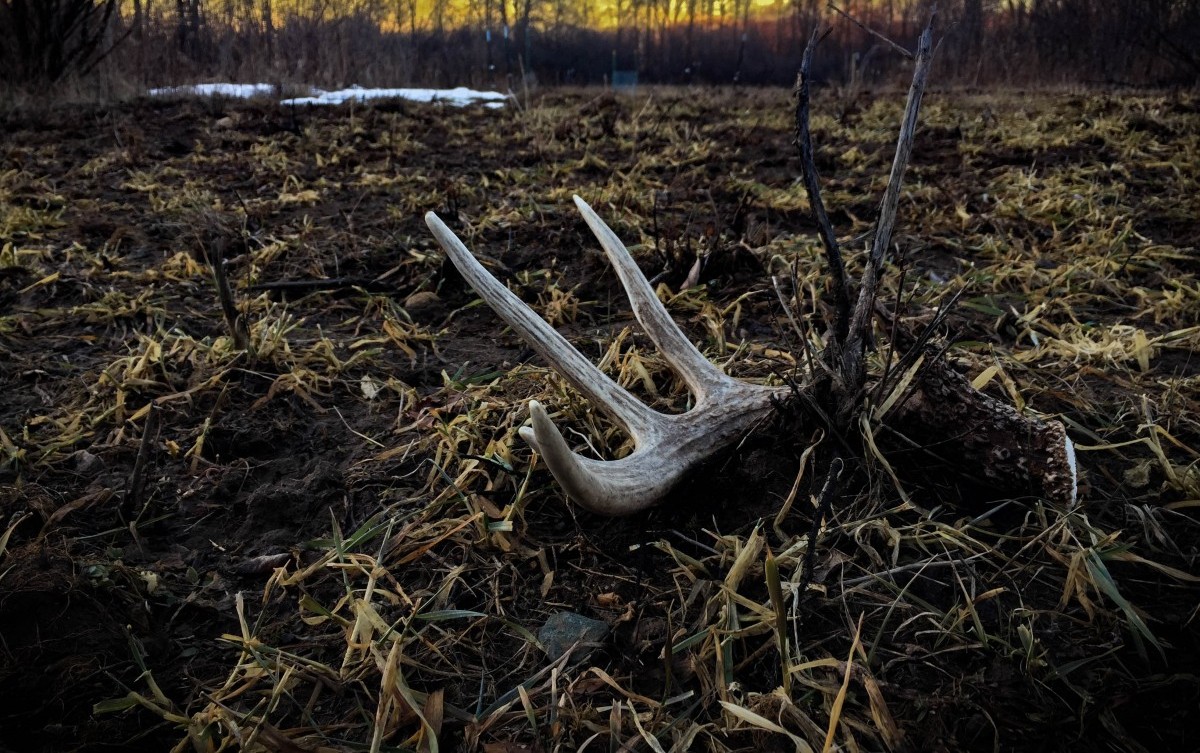Should I start looking for sheds today? Tomorrow? Next week? Next month? As deer seasons come to a close across the country, the inevitable question of, “when should I start looking for shed antlers?” fuzzes our deer hunting wired brains.
As soon as the hunting season ends, the urge to replace that emptiness consumes us and all we want to do is find the hardened headsets of those that outwitted us this past fall. While the urge is great, you will find more bone if you wait until the time is right.
Use the following factors to determine when the time is right in your area.
Why do they shed?
First and foremost, in order to understand when a buck sheds, you need to know the science behind the physiological process. A previous article (The Science Behind Shed Antlers & Why Rack Traps Don’t Work) covers this process in much greater detail, but to sum things up, photoperiod is the trigger. Yes, just like the rut, photoperiod triggers antler drop.
Photoperiod (amount of daylight) signals changes in testosterone levels, which controls antler growing, hardening, and casting periods. Antlers usually fall off within hours of testosterone levels falling below the antler threshold limit, which is why so many sets are found within a couple hundred yards of each other. Since photoperiod is at the helm of controls, you can expect healthy bucks to shed around the same time year after year.
 Above is a very simplistic and general interpretation of how the level of testosterone in a buck signals different antler phases.
Above is a very simplistic and general interpretation of how the level of testosterone in a buck signals different antler phases.
Mid-February is a good time to start your search for antlers throughout much of the U.S. Early-February if you really need to scratch that itch. If I had to put a percentage to it, I would say 90% of bucks are shed by March 1, compared to just 25% by February 1.
Influencers
Now, of course there are many factors that can play a role in when a buck sheds. First off, every buck is a unique individual, meaning what happens to one buck may be completely different from the next buck. Similar to growth spurts in humans, some kids shoot up in middle school, most grow the fastest in high school, and some don’t hit their spurt until college. For deer, some drop in December and January, most drop in February, and some hold their antlers until March or April in much of the country. Many of the Southern states like parts of Texas, Louisiana, Mississippi, Alabama, Georgia, and especially Florida are exceptions to the normal shedding dates.
Stress related factors can also influence when a buck sheds his antlers. Stressful circumstances such as injuries, fighting, poor nutrition, and severe winters can often lead to an early suppression of testosterone levels, thus an earlier antler drop.
When should you look?
Like many answers relating to wildlife . . . It depends. Use the following list of scenarios and suggestions in order for you to determine the best approach and time to be out shed hunting in your area.

Private vs. Public
Obviously this will have an impact on when you should be out in search of white gold. If you have a nice piece of private land all to yourself, you’re better off waiting until March to begin your search. By then most of the antlers have dropped and more importantly most of the snow has melted. Simply stated, there’s no real rush to get out there because they’ll still be there when you do decide to look.
Public land, now that’s a different story. Welcome to the world of combat shed hunting (in certain areas at least). Here’s where the early bird gets the worm. Good public lands often get hit early and often by competing shed hunters. The best approach here is to join them. Don’t just go in their once and check it off your list. If you want to have success, you’ll have to more than likely walk the same chunk of ground multiple times throughout the season because you never know when a buck will drop his antlers. I’d start around the 1st of February and check it several times throughout the month.
Is there still snow on the ground?
Again, an obvious, but important factor to consider. Is there snow on the ground? How much? And when was the most recent snowfall? There’s nothing worse than a Late-February snowfall in my book. Just as you’re about to really ramp up your shed hunting . . . WHAM! In comes a snowstorm and all the sheds are buried for another couple of weeks. Like most shed hunters, I prefer little to no snow on the ground. Not only is it easier to spot the sheds lying on top of the dead vegetation, but it’s also much easier to hike around.
Here in Wisconsin, the snow is usually around into March and sometimes even April. This is when knowing the most recent snowfall is important. If the last snowfall was in January and the cold weather has been the only thing keeping the snow around, then hiking through the white stuff can yield good results. This is because most antlers were likely shed after it snowed, therefore will be on top.
Are you in a competition?
Do you have a friendly competition with your other shed hunting buddies over who can find the most or biggest sheds of the season? I know I do. Competition is a great excuse to get outdoors. Miles = Piles baby! If you got a honey hole of your own that you bring your buddies to shed hunt later in the season because you’re a nice friend, I see nothing wrong with sneaking in there early for first dibs on the “easy” ones.
You might bump a buck.
This kind of ties back into the public vs. private land scenario. If you’re out shed hunting on public land, you’re probably not all that concerned about bumping a buck before he sheds his antlers. However, for private land hunters, this a very common concern. While there is a possibility of this happening, especially on smaller properties, they aren’t likely to move far from food during this time of year. If you bump one still holding its antlers and you happen to have the main food source or the bedding near it, chances are the buck will be back. Again, if you don’t want to risk this happening just wait until March when you can be sure most bucks have shed.
Can you fight the urge?
Hopefully you’ve gotten a pretty good idea on when to shed hunt after considering the above factors. The real question is . . . Can you fight the urge? I know I can’t, which is exactly why I try to gain permission on as many properties as possible and hit the public land early. Just remember, roughly 90% of bucks are shed by March 1st, compared to just 25% on February 1st.







